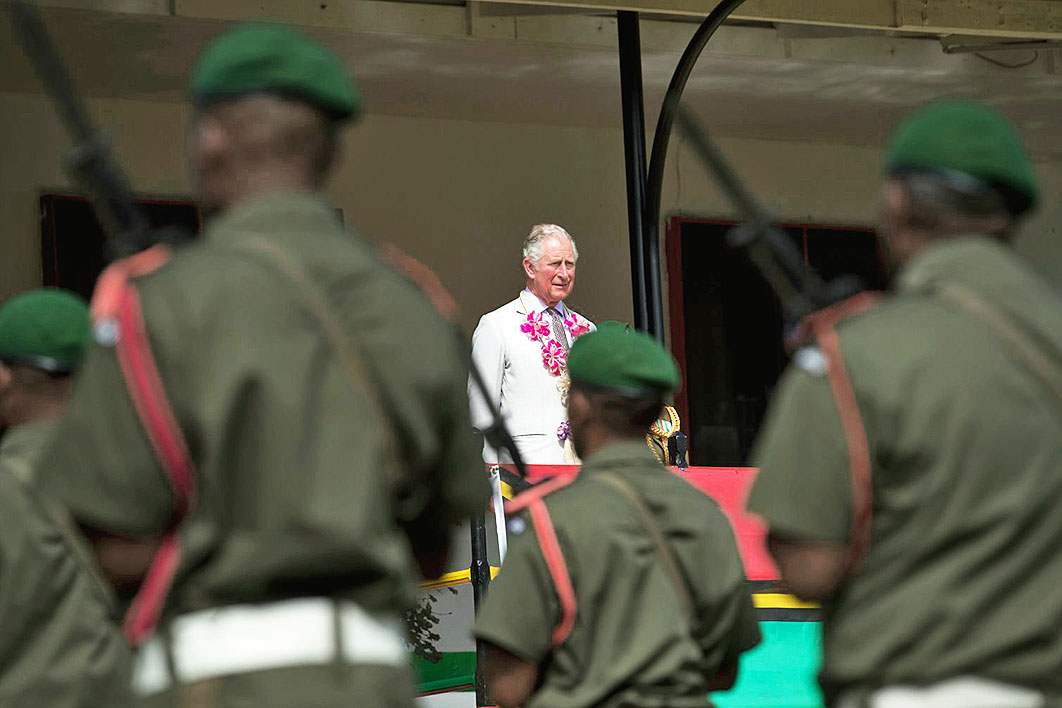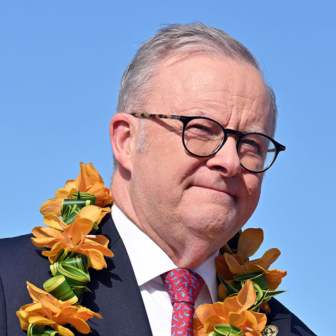As Britain withdraws from the European Union, much attention has focused on whether prime minister Boris Johnson can reforge relations with his country’s former EU partners. But Brexit has global implications, with some Conservative politicians promoting the idea of Empire 2.0, linking countries with historical ties to imperial Britain.
The recent opening of British high commissions in Tonga, Samoa and Vanuatu has been widely touted in the Australian media as a sign of this global engagement. At a time when China is building stronger economic and political ties with many island nations, Australia has welcomed Britain’s increased activity, along with France’s renewed focus on the region under president Emmanuel Macron.
Courtesy of its fourteen dependencies — whose maritime domain spans 6.8 million square kilometres — Britain effectively controls the world’s fifth-largest exclusive economic zone, or EEZ. But the post-Brexit dream of a revived British empire has limits.
Although its withdrawal from Europe has significant implications for all these territories, only Gibraltar was eligible to participate in the 2016 Brexit vote. Residents of The Rock, desperate to retain economic ties and easy access to Spain, voted 96 per cent in favour of remaining in the EU.
The European Commission can still negotiate direct agreements with Britain’s overseas territories as part of the EU Overseas Countries and Territories network. But Britain’s only remaining colonial possession in the Pacific is Pitcairn — the bolthole for the Bounty mutineers and their Tahitian companions after they escaped Captain Bligh’s bad language. Fewer than fifty people remain on Pitcairn, but its EEZ, designated as a protected marine reserve, covers 834,333 square kilometres.
The tiny island symbolises the decline of British imperialism in the Pacific. In December 2004, the government in London announced the closure or downgrading of thirty diplomatic missions in the developing world, aiming to save £6 million a year. As a consequence, Britain formally withdrew from the Pacific Community, the main technical agency serving the islands region.
With reduced diplomatic capacity, Britain channelled significant development assistance to the region through the European Development Fund. Post-Brexit, this pathway to influence is closed.
But the push to create a post-Brexit “Global Britain” means that British Conservative governments have begun re-engaging with the region. At the April 2018 Commonwealth Heads of Government Meeting, or CHOGM, then foreign secretary Boris Johnson announced that London would open or reopen nine new diplomatic posts in Commonwealth. The new posts, he said, “are in regions which provide huge potential and opportunity post-Brexit for British businesses and will help us to deepen our relationships across the Commonwealth.”
The initiative followed Australian lobbying to draw more funding for Pacific nations from Britain’s overseas aid agency, DFID, at a time when Australia’s official development assistance is at the lowest level ever recorded as a proportion of gross national income. Three months after CHOGM, the 2018 Australia–UK meeting of foreign and defence ministers reaffirmed the importance of Britain’s “Pacific pivot.” “At CHOGM in April,” the ministers said, “we committed to launching an Enhanced Partnership for the Pacific to support regional stability, security and resilience. Australia welcomes the UK opening three new diplomatic missions in the Pacific, which will make it the best-represented European country in the region.”
The new missions are now in place: British diplomat Karen Bell re-opened the resident high commission office in Port Vila in July 2019, and the outgoing high commissioner to Vanuatu, David Ward, presented his credentials in Samoa in December 2019. After an absence of fourteen years, the British high commission in Nuku’alofa has reopened, with the delightfully named Thorhild Abbott-Watt taking up her post as high commissioner to the Kingdom of Tonga this month.
All this is being done on the cheap, however. During a visit to London in January 2019, New Zealand prime minister Jacinda Ardern agreed that British diplomats could co-locate with their NZ counterparts and “utilise New Zealand’s current infrastructure to make the UK’s work in the region more cost-effective and collegiate.”
Global Britain is desperately trying to draw on support from the Commonwealth, which marked its seventieth anniversary in 2019. Eleven of the fifty-three Commonwealth members are in Oceania and — in a royals-led recovery — the British government is using longstanding regional attachment to the House of Windsor as a diplomatic tool across Pacific Commonwealth states.
In 2018, just three days after the media furore over a purported Chinese military base in Vanuatu, Prince Charles and Australia’s foreign minister at the time, Julie Bishop, visited Vanuatu aboard an RAAF VIP plane. In October that year, the Duke and Duchess of Sussex toured Oceania promoting the Invictus Games for injured service personnel. In November last year, the Prince of Wales made his first-ever visit to the Solomon Islands, making a speech in pidgin and launching a new ocean conservation initiative and malaria elimination road map.
But even the royals are struggling. Charles’s younger brother, Prince Andrew, hasn’t visited the South Pacific since 1998, and is currently off the diplomatic roster because of his association with the convicted sex trafficker Jeffrey Epstein. Even as the Invictus Games celebrate the courage of wounded warriors, Prince Harry’s 2018 visit to Fiji was notable for his silence about Fiji’s nuclear veterans, who are suffering the health effects of their service in the British armed forces during the 1950s British nuclear testing program in Kiribati. Post-Megxit, the new Royal Sussex brand is more likely to find markets in North America than the South Pacific, even though British troops did burn down the White House in 1812.
Throughout this year, Boris Johnson will be renegotiating Britain’s trade relationship with the EU. Hedging his bets, though, Bojo is also looking to Commonwealth countries like Australia, New Zealand and Canada as potential trade and security partners. Conservative politicians have tried to talk up liberalised trade with former British dominions and colonies, with one-time international trade secretary Liam Fox even promoting a post-Brexit “Empire 2.0.”
When I met the Commonwealth secretary-general, Baroness Patricia Scotland, at the 2017 Pacific Islands Forum, she was boosting a 2015 research report, The Commonwealth in the Unfolding Global Trade Landscape, suggesting the global network can advance the trade interests of both Britain and the Commonwealth countries.
“As the UK comes out of the European Union,” she told me, “it enables them to be freer in terms of the nature and extent of the agreements they are able to make. But trade facilitation opportunities are already there. Although we are looking for trade agreements, we need to exploit that 19 per cent advantage we already have now. What the United Kingdom had already indicated and identified even before Brexit was that there was literally gold in terms of the intensity of our relationship. There was already an awakening of a keen interest in how we trade with our whole Commonwealth family.”
But the Anglosphere powers of Australia, New Zealand and Canada, while eager for free trade deals with post-Brexit Britain, are not blind to the economic reality. Only 1.4 per cent of Australian exports go to the United Kingdom, one-third of the amount going to other EU countries. Highly regarded London Times columnist Matthew Parris, formerly a Conservative MP, describes Empire 2.0 as “a dangerous post-Brexit fantasy,” noting that “over the past half-century Australia’s trade with Asia has risen from less than a third to more than four-fifths of her total. Nothing — and certainly not Brexit — is going to reverse that trend.”
Beyond this, both the European Union and Britain have failed to expand trade relations with the island states of the Pacific, even during the good times. For twenty years, the EU failed to finalise an Economic Partnership Agreement with the Pacific under the 2000 Cotonou Agreement, despite years of fruitless preparation and negotiations. Under World Trade Organization provisions, Britain has wound down subsidies for imports of Fijian sugar. The current negotiation of a post-Cotonou treaty, to be finalised this year, prioritises African nations over smaller Caribbean and Island states.
The main interest among ANZUS allies is Britain’s potential strategic and security roles in the Pacific, through the Five Eyes intelligence network, counterterrorism coordination and possible deployments of the Royal Navy in the South China Sea. The navy has already announced that the new HMS Queen Elizabeth carrier strike group could be deployed for freedom of navigation operations alongside the US navy in the South China Sea.
But even the security sector is fraught with complications. Five Eyes relations are strained by the Johnson government’s recent decision to allow the Chinese technology giant Huawei to play a role in Britain’s 5G mobile network rollout, a policy that is anathema to hardliners in Washington and Canberra. Many analysts also question whether the Royal Navy has enough capacity and funding to prioritise naval deployments in the Asia-Pacific region at a time when the Trident nuclear submarine force is draining Britain’s defence budget. As British naval specialist Geoffrey Till has asked:
Is a significant naval presence in the Indo-Pacific really feasible these days given the dramatic decline in the Royal Navy’s numerical strength, both in platforms and people? And second, would a significantly more substantial naval force in the area contribute to regional peace and security, and would it be cost-effective for Britain itself?… There are certainly risks that it could all go horribly wrong, especially if the British return with a bombast that antagonises, or at least worries, local opinion.
The Royal Navy is also spooked by the possibility of an independent, nuclear-free Scotland — a far more likely outcome than Empire 2.0 — which could force the relocation of Trident submarines from their Scottish base in Faslane.
Despite their public enthusiasm for greater British involvement in the Pacific region, island governments are hedging their bets. In 2016 the Pacific Islands Forum formally invited Germany to become a Forum Dialogue Partner, recognising Berlin’s central role in the EU and in global funding for development.
Under Emmanuel Macron, France too is seizing the new geopolitical opportunities. In April, the French president will visit Tahiti to host a France–Oceania summit with island leaders. The 2016 decision to admit the French colonies of New Caledonia and French Polynesia as full members of the Forum has allowed Paris to assert a growing influence on regional policy on the oceans, fisheries and the exploitation of deep-sea minerals, oil and gas (despite the ownership of these resources by the colonised Kanak and Maohi peoples).
French diplomacy in the Blue Pacific is amplified by the uncertain EU status of Britain’s overseas dependencies. Since the Brexit referendum in 2016, French government ministers have been gleeful about the many opportunities the Brexit vote creates for France. At the 2017 Pacific Islands Forum, France was represented by secretary of state Sébastien Lecornu, who told me that “Brexit will create something new in the Pacific.” With France now the only member nation of the European Union in the region, “the three overseas collectivities, French Polynesia, New Caledonia, and Wallis and Futuna — the pays et territoires d’outre-mer as we call them — are the incarnation of Europe in this part of the world after Brexit.”
One symbol of France’s new assertiveness is the appointment in September last year of the French ambassador to Fiji, Sujiro Seam, as the new EU ambassador to the Pacific.
For France, with its far-flung colonial empire, the UN Convention on the Law of the Sea provides significant advantages. Metropolitan France has only 340,290 square kilometres of EEZ in Europe, but its overseas dependencies add eleven million square kilometres of EEZ worldwide. Without these territories in the Pacific, Caribbean, Indian and Atlantic Oceans, France’s EEZ would rank forty-fifth in the world, rather than second.
More than seven million square kilometres of France’s EEZ are in the Pacific. French Polynesia has an EEZ of more than 5,030,000 square kilometres, while New Caledonia adds 1,740,000 square kilometres and Wallis and Futuna a further 300,000. Even uninhabited Clipperton Island — near the vast seabed resources of the Clipperton-Clarion fracture — has a larger EEZ than metropolitan France.
This vast maritime domain has a geo-political as well as economic role for France and the EU. As a 2014 French Senate report noted:
These are spaces which involve both the reaffirmation of the role of France’s overseas territories, but also the place of France and Europe in global governance in the 21st century… the 11 million square kilometres of EEZ and their potential resources pose an opportunity both for France and for Europe in the economic competition on the international stage. Furthermore, by their specific characteristics, France’s overseas possessions bring Europe an opportunity for opening unequalled in the world.
As the EU moves to finalise a new treaty with the members of the Organisation of African, Caribbean and Pacific States, Brexit will reverberate far beyond the English Channel. Will Britain’s old enemy across La Manche benefit most from the changing geopolitics in the South Pacific? •




